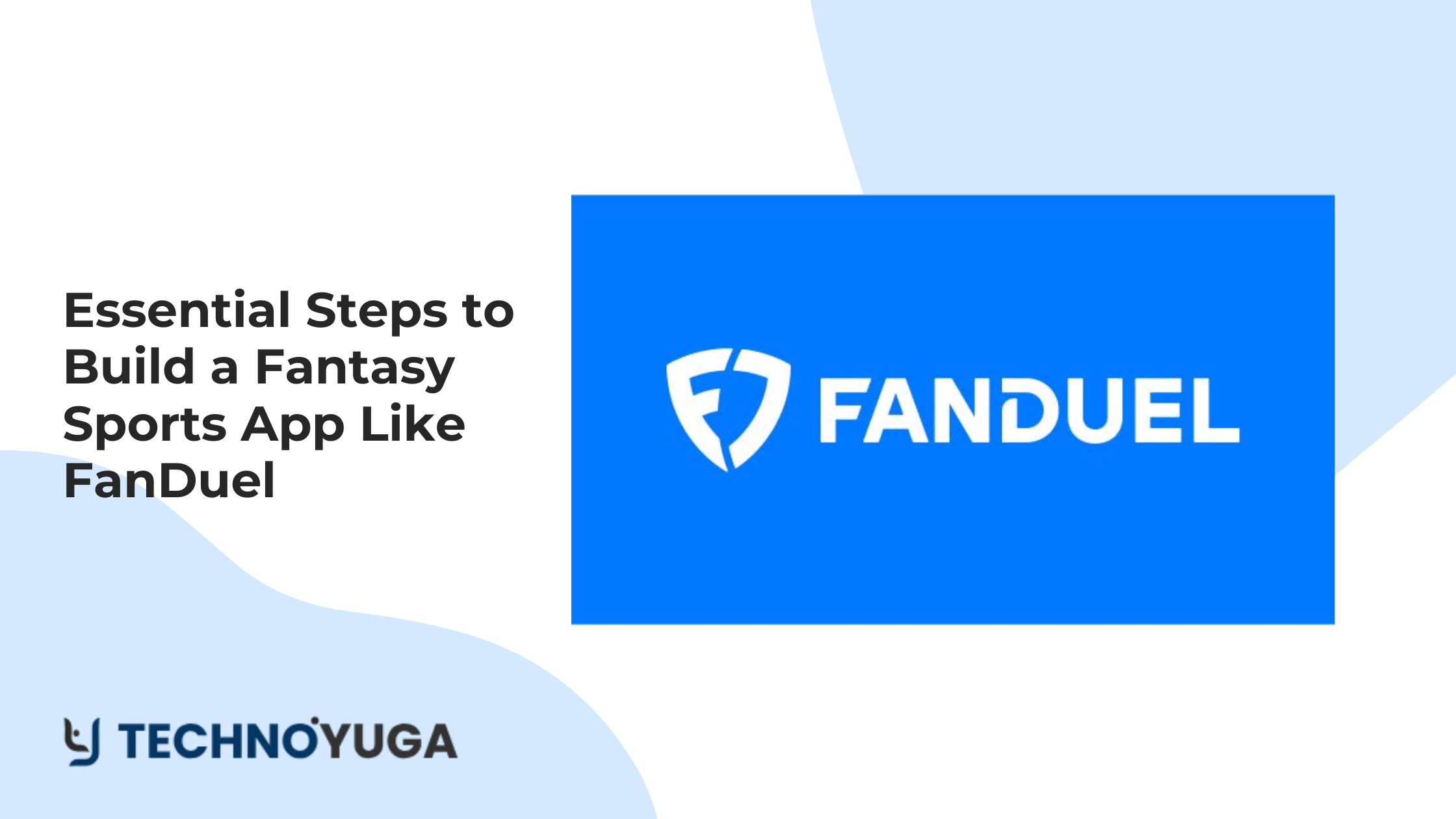Build a Fantasy Sports App Like FanDuel requires careful planning and execution. In this aspect, FanDuel has proven to be one of the best in terms of Fantasy sports services where clients are compelled to continue using the page. To Build a Fantasy Sports App Like FanDuel – an application for the formation of virtual teams and their competition – the platform must meet several requirements: easy to use and provide all the necessary tools for forming teams, monitoring their performance, and competing with other users.
This blog will provide you the basic framework that you need to follow to Build a Fantasy Sports App Like FanDuel that can take on the likes of FanDuel. Every step inside the game development process is significant, starting from market analysis and determining the scope of the project to choosing the right technology stack and following legal guidelines.
Further, we will discuss features like designing the CPI-based user interface, feeding real-time data, and designing development strategies to keep the user sticks to the application. Whether you are an emergent startup interested in entering the field of fantasy sports or you are an experienced company that wants to add a new vertical to your services, this guide will be helpful in each step of the construction of a fantasy app that would take a competitive niche.
Read more!
Understanding the Fantasy Sports Market
Before you start build a fantasy sports app like FanDuel, it’s crucial to have a deep understanding of the fantasy sports market. Fantasy sports involve using real athletes to form dream teams, joining leagues, and earning points based on the achievements of the selected players. They can make this decision for one reason – the appeal of rational planning combined with a dash of healthy competition.
Currently, there are already established giants in the industry, like FanDuel and DraftKings, and the users have their expectations set quite high for an ideal fantasy sports application. It has real-time scoring, player drafts, and the ability to engage with the community – basic but vital for any application of this nature. Knowledge of these competitors should aid in determining what strategies are effective and where change could occur.
A second critical aspect is defining your target market. In general, users of fantasy sports apps are generally sports fans, but understanding the specifics of their interest including the type of sports, the preferred leagues and how they use apps will assist in creating the best app. This means that through proper market analysis you can be able to position your application to compete well within this market.
Defining Core Features of an Fantasy Sports App Like FanDuel
When you start to Build a Fantasy Sports App Like FanDuel you must define its core features, here they are:
Player Drafts and Team Management
Player selection and team formation are the core of any fantasy sports platforms like FanDuel or DraftKings etc. This feature enables the user to assemble his or her dream team from real sports leagues available. Drafts can also be of various types like snake drafts where each user selects the players in turns or an auction based draft process where users buy players. After a team has been created, users are able to trade players, add or drop players and set their line up for each game. The management of the teams is important for users to identify their strong and weak players, those currently on the bench due to injuries and upcoming fixtures. This feature makes the user active the whole year in making the best team that they desire to achieve.
Real-Time Scoring and Updates
To ensure that users are actively engaged with your fantasy sports app, scoring must be real-time and highlighted by updates. This feature gives real-time updates on players’ performances during actual games and then gives the numbers as fantasy points affecting the user’s position in their leagues.
Application users can view how their team is performing at anytime and can determine standings based on leaderboard information filtered through the scoring system. The latter is a feature that fosters a thrilling experience of fantasy sports, as users get to observe the consequences of their drafted players’ performances in real time. Emphasis should be placed on frequent and correct updates to keep the users interested with a perceived control over their fantasy teams.
User Profiles and Leaderboards
User profiles, and the leaderboards, as key features that are necessary for a competitive and individualized approach to the game in your fantasy sports application. A user profile provides a summary of a player’s performance, records, and rankings in various leagues and lists the player’s accomplishments.
Traditional user profiles may encompass information such as the win/loss lead record, favorite team, and championship victories. Leaderboards, in contrast, offer a rating system that indicates how the users perform compared to other players in the leagues and other users in the entire platform. This feature makes users compete by pointing out that they are being ranked by the system and that they should perform better. Leaderboards can also fuel engagement since it pushes a reward/ recognition system that awards the best performers.
In-App Chat and Community Features
Live chat and community elements are crucial for enhancing the interactivity of your app and making it even more appealing to users interested in fantasy sports. Such features enable the users to converse among themselves inside the app – if they wish to exchange tactics, argue over trades, or just banter rationally.
Some of the visible community features include league discussions, private group chat, and forums which can also be useful in providing feedback. Such features can help to enhance user loyalty because users would be willing to spend more time with the platform if it makes them feel like they are part of a community. An active community also allows individuals to learn tricks and approaches and therefore enhance their experience.
Payment Integration for Entry Fees and Payouts
If your fantasy sports app offers paid contests or paid entries, payment integration is an essential aspect to implement. This feature allows users to put their cash, participate in paid leagues or contests, and collect their winnings without having to worry about security issues. Accepting different types of payments like credit cards, digital wallets, and bank transfers also allows users to handle their money smoothly within the app.
Moreover, it should be convenient and secure to guarantee that the exchange is fast and free from mistakes. Payment integration also encompasses managing multiple currencies and adhering to the legal requirements, which can be beneficial when attracting clients from around the world. Users’ trust is another important aspect that needs to be considered through integrating secure and reliable payment methods for paid games.
Steps You Need To Follow To Build a Fantasy Sports App Like FanDuel
Follow the steps below to Build a Fantasy Sports App Like FanDuel:
Conduct Market Research and Define Your Niche
Before proceeding with the creation of an application similar to FanDuel, completely studying the market is crucial. It aids in gauging the current climate in terms of trends, user attitudes, and the nature of products or services being offered by rivals. Analyzing successful apps, such as FanDuel, one can determine which features and functions are expected by users. Also, market research gives cues on what is lacking in the market, which in this case can be an opportunity for the app to fill in.
It is also essential to establish your specialization; for instance, you have the choice to target a specific sport, your viewers, or present your app as something different from the classic game applications. The identified market ensures that apps developed are fashioned towards meeting the needs of users in the targeted niche and thus have higher chances of success in a competitive market.
Create a Detailed Project Plan
To Build a Fantasy Sports App Like FanDuel you must Project planning is one of the critical steps that are essential when designing a successful fantasy sports app. This should define every detail of the project, like the basic functionality you want to have in your product, how much it will cost you and how long it will take to develop the project. Begin by identifying the key activities that you plan on offering to your app users, including player drafts, real-time scores, and user profiles.
Finally, it is useful to divide the totality of the development process into stages and establish specific objectives and activities for each of those stages. Devise a plan that provides a rough estimate of the time that will be required to complete each phase and human resources which will be required such as developers, designers and testers. Project schedule also contributes to the cost and budget estimates in a given project by assisting in proper organization and planning to guarantee the project is on the right course and within the right financial capacity. It also serves as a road map to guide the overall development process and assist in the management of stakeholder expectations.
Choose the Right Technology Stack
Selecting the correct set of technologies is crucial when building a strong and scalable product like FanDuel fantasy sports app. Technology stack is defined as the set of programming languages, frameworks, and tools needed for creating the app. Frontend options are such technologies as React Native or Flutter that will allow the creation of a non-raw cross-platform mobile front-end.
For the backend, solid frameworks such as Node. js or Django are capable of handling large amounts of data and traffic which are inevitable in fantasy sports apps. You will also need to interview real-time data processing tools to ensure that the users are able to receive the live updates whenever there is a game. Another essential concept to consider is the inclusion of third-party APIs, which gives users relevant and current sports data. Choosing the right technology stack makes your application fast, secure, and ready to adapt to growth in the future.
Design the User Interface and User Experience (UI/UX)
When it comes to your fantasy sports app, the user interface (UI) and user experience (UX) need to be carefully designed to capture and engage the users. The UI shows the interface—the placement of items, the colors, the typeface and the general graphic design of the objects. They have to be clear, easy to navigate, and uncluttered, especially for the target audience of sports lovers.
On the other hand, UX emphasizes how users move around this app and how simple or otherwise it is for a user to complete tasks such as drafting players or checking scores. When it comes to UX, the idea is to make the end product easily usable, easily navigable, fast loading, and optimized for different devices. We also need to take into account that a significant number of people may use the app through their smartphones, which means a mobile-first design can be effective. Focusing on both UI and UX ensures that when users are using the app, they find it not only useful but also enjoyable; this translates to higher satisfaction from the users.
Develop the Core Features
Creating the fundamental features of fantasy sports apps helps in making them more interactive and useful. Levy starts with the construction of features in player drafts, team management, and real-time scores since these are the main components of fantasy sports. It is normally expected that users should be able to draft players, organize their teams and follow the performance of their players in real life through updates.
Add features like user profiles, scoreboards and/or a way for users to communicate with each other such as in-game chat. If your app is to include paid contests, you need to integrate payment for deposits, withdrawals, and payouts securely. Every feature should be developed with the user in mind to enhance their experience and the usability of the device. When integrating them, it means that the developers should spend ample time running tests on these features to know how useful they are to users, and if they need any repair before they are released to the public.
Ensure Legal Compliance and Security
One should therefore ensure legal compliance and security, especially when the online game app like FanDuel involves monetary usage. Initial steps should include identifying the legal contexts of the countries or states where fantasy sports will be provided since they may fall under gambling laws. Always ensure that one has the required license and follows the laid laws in the specific area of operation.
For user security, employ encryption standards to secure users’ information and financial information. Also, incorporate measures that would help avoid such practices such as fraud and unauthorized access. Complementing gaming features with tools and mechanisms to prevent problematic gambling, like setting deposits and session limits, and creating account exclusion mechanisms, is crucial in providing safe gaming experience. Ensuring legal requirements and application security will not only help you gain users’ trust but also help you steer clear of legal issues that may harm your app.
Test the App Thoroughly
This is where testing comes in handy to make sure that your fantasy sports app is fully functional and user friendly. Start with the functional testing to ensure all elements of the app including player drafts, real-time score update and payment gateway functions are working correctly. Performance testing makes it possible to check if there are any delays or crash when the website is busy on a game day. Security testing is also necessary to protect user’s data and also the financial details as well.
Automated testing for Android, iOS and Web guarantees the compatibility of the application and good experience among all platforms. Further, incorporate the use of beta testers to get an insight of the actual market feedback and any problems that may have been overlooked. If you test your app well, it will eliminate some of the issues that may cause a problem and make sure you are putting quality into the market.
Launch and Market Your App
The release of your fantasy sports app is a great accomplishment, but to successfully deliver your product/service to your target public you need a good marketing plan. Start by improving your app’s discoverability on app stores through keywords, appearance, and text that will interest possible users. Employ social media sights, online ads and the marketing strategy of influencers to promote and ensure the downloads of the app.
To be able to gain followers initially and devise a way of getting the word out there then one can use elements such as free entry into paid competitions or incentives for the use of referrals. Search for sports bloggers or personalities who would be interested to join and be more recognized in the fantasy sports community. Throughout the launch phase, it is essential to pay close attention to what users are saying and be ready to respond to any concerns that arise. If your app begins with a successful launch, the continued marketing campaigns will ensure that your app thrives in the competitive fantasy sports industry.
Maintain and Update Your App
The continuous updates and maintenance to the app become very crucial even after it has been developed and released to the public domain. Manage the app to ensure it is running smoothly: collect data about the users and feedback to make changes if necessary. If there are any bugs or problems with the current version, fix them to guarantee the users a smooth run.
To be specific, always release new updates with more features either in the form of more sports or elaborate social features to entice the users. Superiority of similar applications can be achieved by constantly updating features with the latest industry advancements or technological improvements. Another benefit of updating your app is to take advantage of seasonal promotions or presenting some exclusive content, which can help to keep users interested and bring new ones. Maintenance involves periodically fixing up the app to prevent security issues and keep the interest of the users for the longer run.
Cost Of Build a Fantasy Sports App Like FanDuel
The cost to develop a fantasy sports app similar to FanDuel will differ based on several considerations, including the application’s designs, functions, technology, and developers. Here’s a breakdown of the main cost factors:
App Complexity
Development of a minimum viable product with features such as player drafts, scoring updates and leader boards may cost approximately between $30000 to $50000. However, if you are targeting to develop an app with complex functionalities such as in-app chat, payment integration, advanced user profile, etc., the cost could range from $70,000 to $150,000.
Technology Stack
The cost will also be determined by the specific technology to be used for backend programming, real-time data processing and the user interface. If used technologies such as machine learning recommendation systems or even blockchain for payments security and authentication are chosen, there will be high development costs.
Development Team
In general, hiring a development team from such countries as the US or Western Europe will cost more than in such countries as India or some countries in Eastern Europe. Independent contractors typically charge between $50 and $200 per hour depending on the location, experience, and difficulty of the work.
Ongoing Maintenance and Updates
Once the app is developed and released, maintenance, fixing the bugs, and new feature improvements can cost about 15-20% of the total development cost for the year. This makes sure your app is developed with the latest trends and technologies in mind. Therefore, it can cost approximately $30,000 to develop a simple FanDuel-like application and anything between $150,000 and above to develop a complex application.
Conclusion
Build a Fantasy Sports App Like FanDuel that allows the user to play fantasy sports needs strategy, suitable features, and a good UX design. Starting with identifying the potential market and defining the essential application features through meeting the legal requirements and guaranteeing security, every stage contributes to developing the successful application. The experienced features, including the player draft mechanisms, real-time scoring system, and payment functionality will improve user experience.
The preparation’s testing activities and marketing strategies are to ensure a successful launch and to reach the right target audience. Hence, constant app update after the launch and sustaining the app is crucial to continue using and compete in the market. It can be seen that while the process of development is rather intricate, there are certain ways dividing the process into several stages that can yield positive results to both – the developers, as well as users. When implemented correctly, your fantasy sports app can be successful in the expanding market and offer entertainment to the tremendous amount of sports fans.







